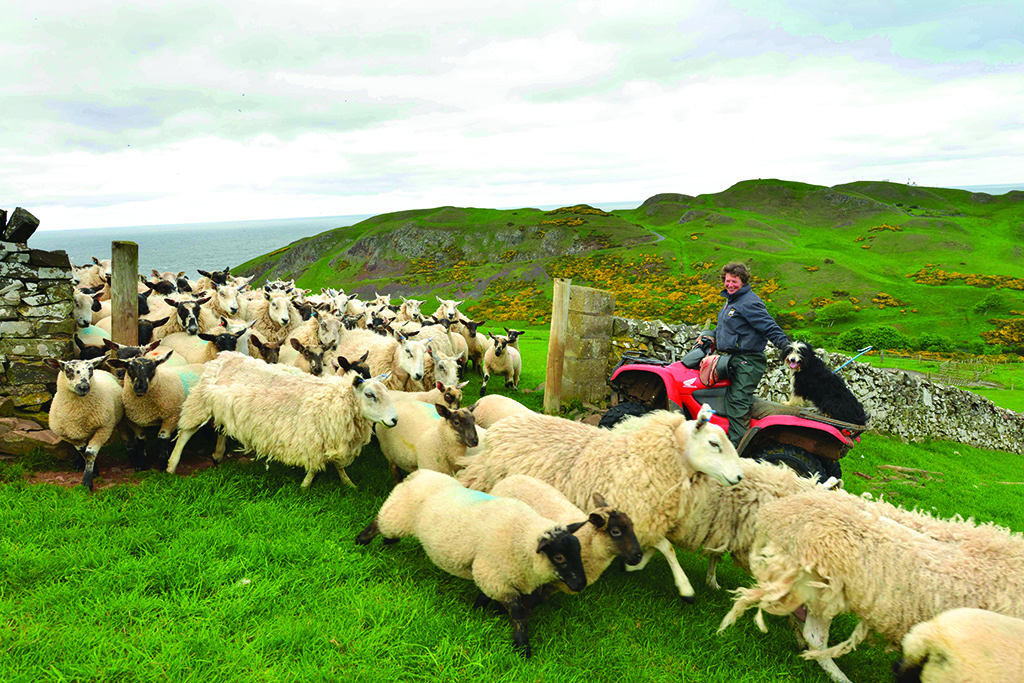
Working on the land is all in a day’s work
An increasing number of women are making their mark by successfully taking on roles in the countryside that were traditionally occupied by men.
Scottish Field highlighted just some of them in a feature in 2014.
ALI GORDON, 47, SHEPHERDESS, ST ABB’S HEAD, BERWICKSHIRE

Ali Gordon looks after 950 sheep at St Abb’s Head
I came from a farming background myself; my parents bought the farm here at St Abb’s Head in about 1980. We used to farm over in Dumfriesshire before coming here. I went to Edinburgh and got a higher national diploma (HND) in agriculture but learnt mostly from my father and working on farms. After college I went to work on various other units and I spent four years in New Zealand and Australia.
Most mornings I’m up at 5am. I generally look after all livestock with 950 breeding ewes and 80 cows spread across 440 acres. I do all the sheep work myself and get help at lambing time. Throughout the winter a man comes in to help me on the farm and he does the tractor work feeding the cattle.
To start with, as a woman it was a little hard, but I think over the years you earn your respect. A lot of sheep handling is technique, it’s not brute force. Of course it’s a very physical job but there is a technique to handling them.
There are a lot of women shearers and it’s through the technique of tipping the ewe or the tup and holding it as opposed to brute force that is the key.
I actually think there are a lot more women now coming into farming than we have seen in a long time and a lot of very capable women.
You now find on lots of agricultural courses there are more women coming onto them than men. When I did an HND I think there were 36 of us with only six females, but I think that’s changed over the years. My niece, who is 23,
has just completed a course at Cirencester and is coming into farming and there are quite a few in her age group in this area who are interested as well. There are more coming up through the ranks I would say.
I enjoy the variety of farming and working with any livestock. I like seeing the improvement that comes through the ranks of having better stock. Lambing and calving time is always a popular time of year because that’s where you start to reap the rewards of improving on the genetics and having better tups or better bulls. There are days when it’s really wet and windy and I think it would be nice to be in an office but I’ve not been tempted by a city career. I think I will definitely always be a livestock farmer.
ALISON MILNE, 33, FARMER, DEMPERSTON FARM, STRATHMIGLO, FIFE
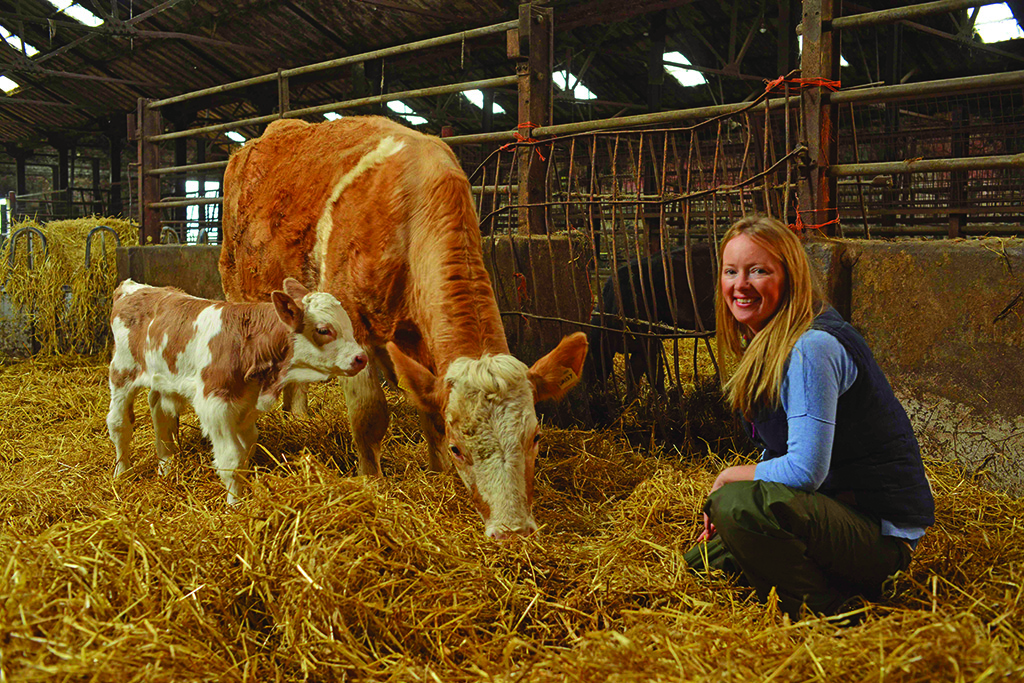
Alison Milne gave up her job with the NFUS to spend more time on her family’s farm
I’m a farmer’s daughter so in some sense I’ve been involved in farming all my life. Last June I left my job as commercial and operations director at the NFUS to be more hands on with the family farm. I also wanted to spend more time with my five-year-old son, Max.
Like any working mother, I have to juggle things and, although the farm is a wonderful learning environment for a child, it can also be a dangerous place so some jobs are just not possible when Max is around.
On a day-to-day basis my role on the farm is very varied. I tend to be more involved with the livestock side than the arable but that may change this harvest. I did drive the grain trailer last year and have been known to roll fields and bale if a spare hand is required, which it usually is.
As with any family business, everyone just mucks in so I am happy to do whatever is required on the day. We also operate a fairly traditional business in that I still make dinner for everyone at work during harvest and believe me it is entirely preferable to eating my husband’s efforts.
The sheep enterprise is really mine. Working with livestock there can be some challenges being a woman. Certainly with things like calving; if I have to assist a cow with calving I just don’t have the strength to do that by myself.
It’s different with lambs though. I’m more than able to get stuck in with lambing. It’s not uncommon to be a female farmer.
Women’s role in farming is just not publicised as much. In almost all family farming businesses, a woman will be involved in some way whether hands-on or working off farm and providing much needed support. It would be great to see more women involved in representative roles in the industry as they play such a huge part in the industry.
I work in partnership with my husband Danny and his parents and it works well. In family farming businesses succession brings both opportunities and challenges but our view will always be that we are simply looking after the business for the next generation, should they want to become involved.
Danny and I are both responsible for much of the day-to-day management of the business and one of the objectives of me being more involved was to review our enterprises and develop a business plan. I am responsible for doing all the management reporting, lambing and calving analysis and gross margin calculations. Real value can be added from the experience I have had in the business sector.
Farming can be tiring and it is constant, but I’ve never felt anything other than privileged to be part of such a great industry. Farming families the length and breadth of this country are the basis of a hugely successful food and drink industry and their role as stewards of the countryside is one that they cherish.
SOPHIE CLARK, 19, GAMEKEEPER, REAY ESTATE, INVERNESS-SHIRE
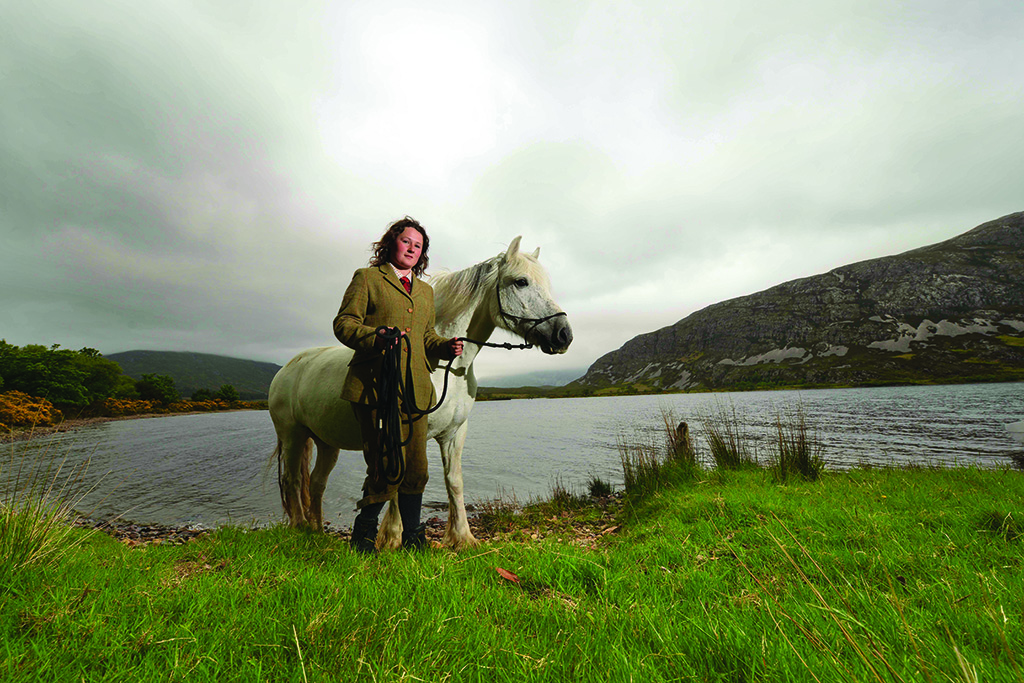
Sophie Clark always wanted to work in the outdoors
When I was at school, I always knew I wanted to work outdoors. My grandfather was a gamekeeper down in Fort William. I’m lucky the estate I’m working on is close to where I’m living so I found out about it and had a few days out on the hill to give me some experience. I’ve just finished my studies at North Highland College and am now working full-time on the estate.
The stag season is our main season and runs from 1 July to 20 October, during which I’ll be the ghillie on the hill with stalkers. We take ponies onto the hill to pick up the stag from where he’s been shot and we take it back to the larder and clean it out there.
I think the best thing about the job is that you never know what’s going to come next. It’s very varied. I can’t imagine not working outside either. The first year I was here there were no other females working but another girl joined us last July doing a similar job to me. In my first year at college there were only males on my course and my second year only one other female
joined.
Personally I don’t know if there are many other female gamekeepers. When I first came into the profession I hadn’t really thought about it being a male dominated environment. I did soon begin to realise it was mainly a male working environment but it never stopped me.
I can imagine however, that balancing a family in the future and carrying on with this job will be quite hard so it may have to be one or the other for me.
I do think more should be publicised about women working in similar fields. There isn’t anything stopping women, well certainly nothing has stopped me so I shouldn’t see why others should feel put off just because it’s a largely male working environment.
JANE ORR, 26, FARMER, FOODIE FARM, NEAR CUPAR, FIFE
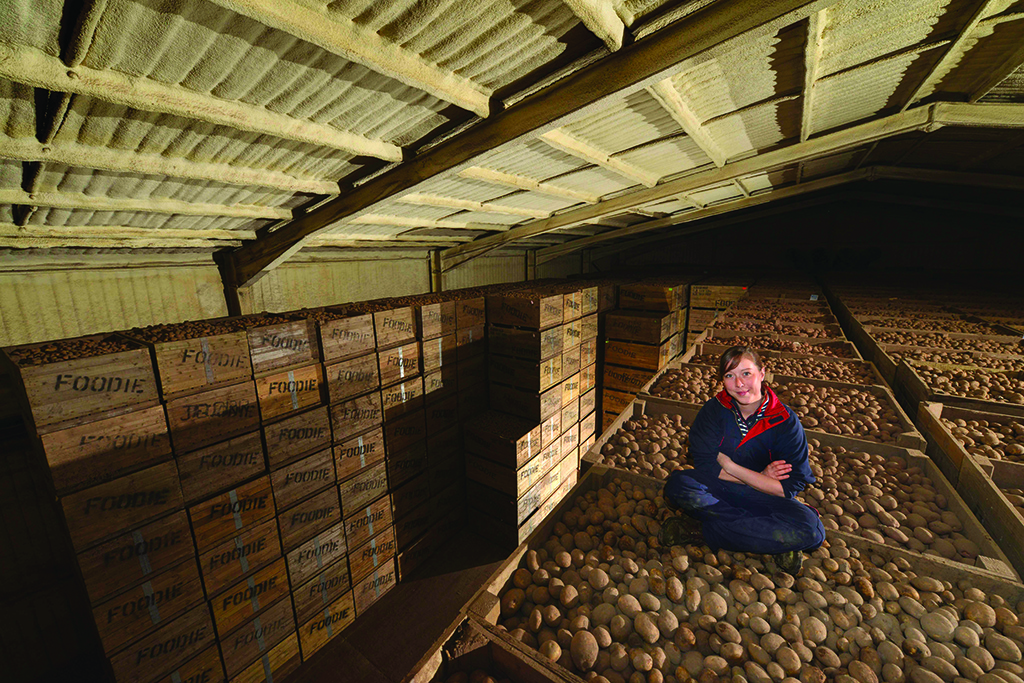
Jane Orr works with livestock and potatoes in Fife
I have always worked on the farm. I gained a degree in rural business management with agriculture in Aberdeen, working here at weekends and holidays too, so it’s just something I’ve always done.
My daily duties on the farm depend on the season. At this time of year I start the day feeding livestock and then I join the potato planting team, my job being to cultivate the soil into ridges, using GPS technology, to increase accuracy and efficiency.
I enjoy concentrating on the livestock most, but we also farm arable crops such as wheat and a large acreage of potatoes.
This is the first year my younger brother and I have both been back working on the farm, after us both studying and then travelling. Having us both home full-time allows more flexibility, so I have more time to spend at our new holiday lodges diversification project, called Elderburn Lodges near St Andrews (www.elderburnlodges.co.uk).
The best thing about working on the farm is being outside in the fresh air. Also, it’s always different, no two days are the same. Whether that’s a good thing or a bad thing, I’m not sure, but it keeps us on our toes.
As for the worst parts of farming, the early mornings can be a struggle for me, although it is worth it if it’s a rewarding day. I’ve always wanted to work on the family farm. The only other thing I have been tempted to do is stage management. I stage managed a production at school and really enjoyed it, although I could still do that as a hobby.
Farming is still, very much a male-dominated industry. We frequently have people – funnily enough, usually men – asking where the farmer is. Particularly lorry drivers, they are the worst for assuming the farmer must be a man.
More and more women are getting into farming though, whether they’re actually on the farm or through different aspects of the industry. Of course, there are challenges being a female farmer, but challenges you just have to get over. These days if I need a hand with something I’ll ask. I used to just try and do it all myself, but I’m not too proud to accept help now.
In terms of age too, with a high percentage of farmers being in their 60s, I am in the minority. However, there are still lots of opportunities, encouragement and support available. Agriculture is a unique industry, in which we gain a great deal of knowledge and experience from past generations too.
I am quite fortunate that our farm is in an area which has a very active and enthusiastic Young Farmers Club, creating support and a social network locally. This helps with many skills, from practical courses to personal development. I do see myself staying in farming. I enjoy it, at the moment anyway, so I don’t see why I would give it up.
EMILY TE KAPA, 20, SHEARER, EDINBURGH
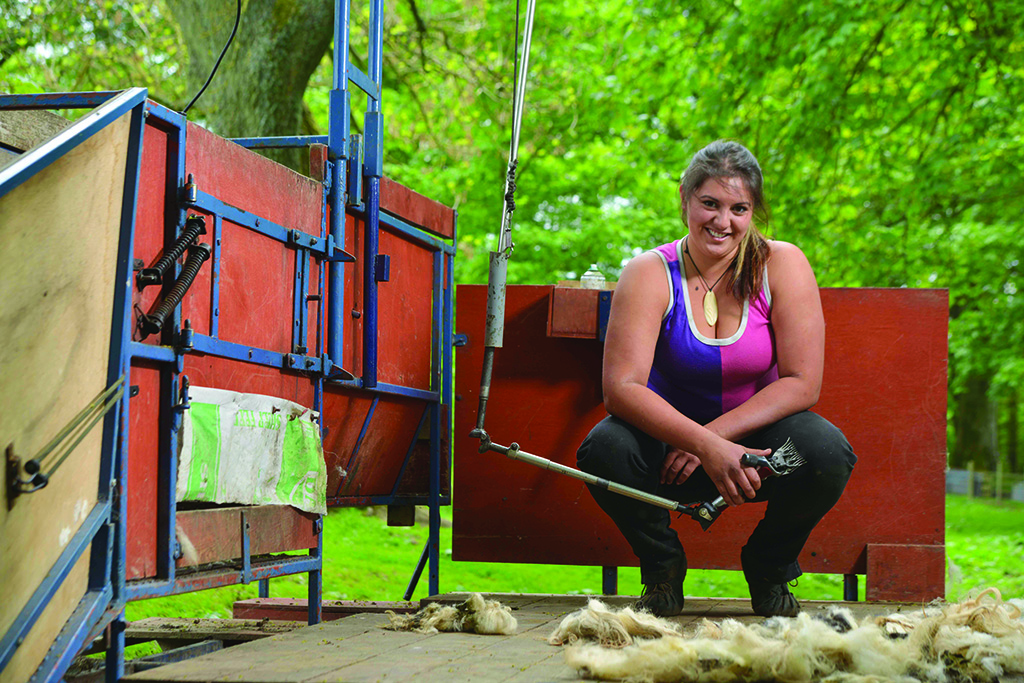
Emily Te Kapa has worked with sheep in Australia and New Zealand, as well as in Scotland
I was born in Crianlarich in the Highlands. We lived up there until my dad stopped shearing, then we moved to Edinburgh. I didn’t have much interest in shearing at first even though my dad did it. It was later on in high school
when I needed a summer job that I became interested. I came down to Lanark with my brothers and started getting involved then.
Going to shearing competitions also really got me interested. I’ve been working with the wool for five years and I’ve been shearing since the end of
my first year. I’m just about to start my second year shearing. I’ve worked in Norway, New Zealand, Australia and most recently the Isle of Man. In Australia I was in a shearing gang that was based in town and we travelled to farms that could be up to two hours away where there were thousands and thousands of sheep.
I know three women sheep shearers who do the circuit in Scotland. There are plenty of women that shear on their own farms but there are definitely far more men shearers. Australia encourages women greatly in shearing compared to over here. There were a couple of male long faces when I won a competition down in England recently.
It’s quite a technical job, shearing. The equipment requires specialist care so even once you’ve finished work for the day you go home with homework to do. Working hours can vary in this job depending where you are working.
Where I work we do eight hours a day with two hour stints. Scotland is by far my favourite place to shear because you can go and see so many different
places. I’ve seen so much of Lanark recently and so much of Scotland. We have a lot of shearing competitions as well, they keep you moving around.
In the shearing industry everyone knows everyone. I’ve also been fortunate enough to have grown up with a lot of older shearers who look out for me. I would recommend any female who is thinking about a career in shearing to
look into it. Everyone’s been very encouraging and I’ve received a lot of help.
LILLY BERNARD, 92, FARMER, WEST DELORAINE FARM, SELKIRK, BORDERS
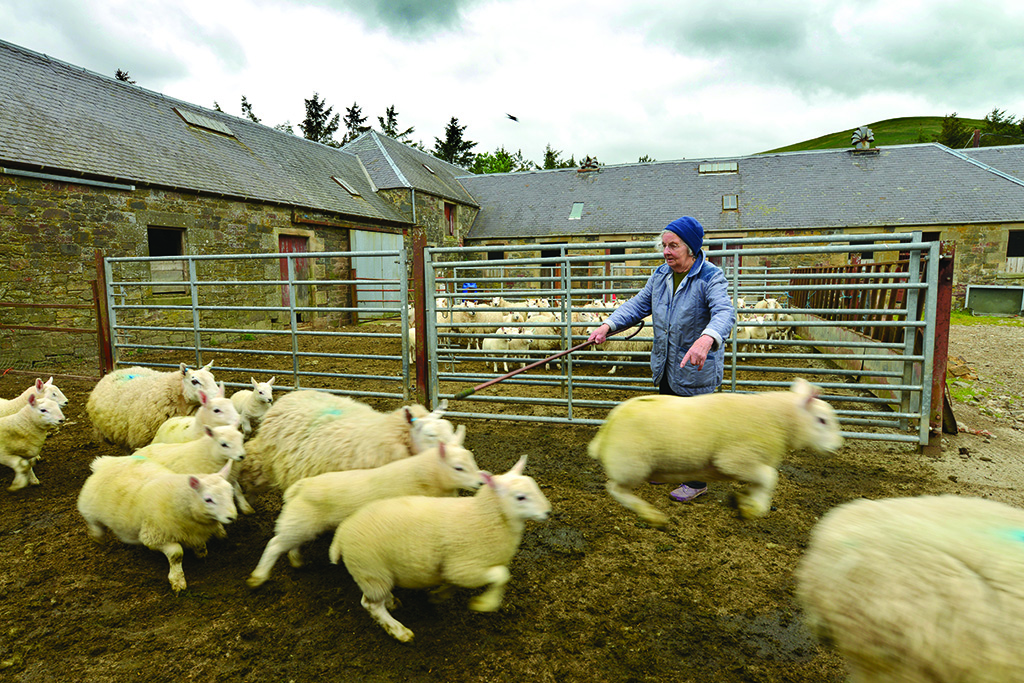
Lilly Bernard, 92, working on her family’s farm
I’ve worked on the family farm since I was about 14. Now I’m 92 and I still help out. I don’t do as much outside as I used to but I help my son. At one time I did work outside in a hands-on role, driving tractors. These days I still very much know what’s going on on the farm.
Personally speaking I don’t think women farm as much outside these days but that is because it’s all done with machinery. When I started out on the farm it was done with horses or by hand. We didn’t have a car. We had a trap, but you couldn’t take that everywhere, so you had to walk or cycle. People don’t cycle these days, they drive or sometimes walk.
West Deloraine farms livestock. We have around 800 sheep and 80 cows. I used to do the lambing. The calving was more difficult because they are quite a bit bigger. You have to go out and feed the sheep in the winter and in the summer you have got to make hay. I used to use a scythe and cut the hay by hand. It was hard work but you had to get on with it; you were just expected to.
What a lot of people outside of farming don’t realise is that when a beast dies that’s your profit gone. In farming you don’t get a wage at work.
During the war it was very hard. Everything was rationed. It’s not like these days when you can just eat fast food. We also used to walk four miles across the hill to the dance in our long dresses. It was easier to go over the hill than round it. We thought nothing of it. When you live in the country you have to go for miles before you even get to a shop.
Now I look after the chickens, feeding them and putting them to bed. We also have some holiday caravans that I help with at the beginning of the season, washing the linen and suchlike. My daughter-in-law helps with them too.
Farming has changed a lot. I do have a computer now but I don’t use it, it’s really my daughter-in-law that uses the computer.
I love the farming lifestyle and being outside. I would never have liked to work in an office. If I hadn’t been a farmer, I would have liked to be a doctor. I wouldn’t want to be a nurse though, I want to be the one holding the knife.
KIRSTY ROBB, 46, FORESTER, ARGYLL
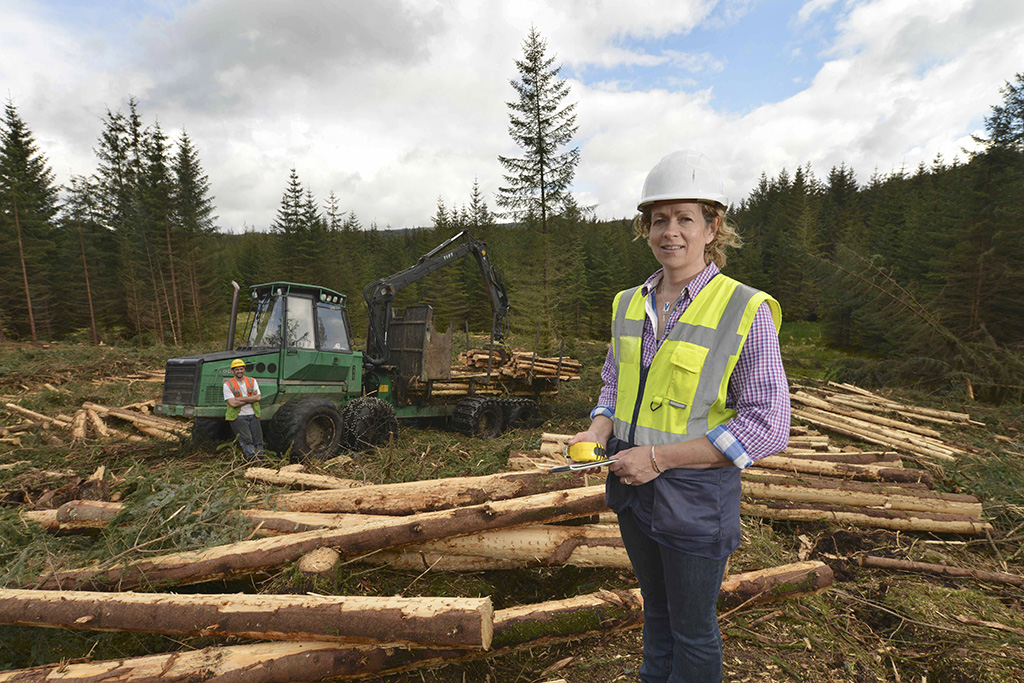
Kirsty Robb has swapped horses for machines in her forestry work
My father was a farrier and we had always kept horses. I got involved in forestry through using horses for timber extraction and myself and my partner did that for about ten years.
The year that foot and mouth was really bad we weren’t allowed to use the horses in the forest so we both got alternative jobs and started work for the Forestry Contracting Association managing its projects. Then from there
I worked for a contractor doing harvesting site management and then went back to project management for Rural Development Initiatives, which led to a job as its timber transport project officer.
I’m currently a log buyer for Ridings Sawmill at Cardross and buy standing timber for the sawmill and roadside logs as well. On the standing timber side of things, I manage and organise all the harvesting and haulage for that.
I’ve always wanted to be outdoors and work outside rather than inside. I never went to college or university and, once I’d entered the work place, that was me. It’s a very male-dominated environment I work in. I don’t work with any females apart from the office staff at the mill. Having said that though there are women foresters that work for the Forestry Commission that I do have contact with and there are some women doing similar roles now for other companies. I would say that we’re edging in.
Personally I haven’t found being a woman difficult in my field. It hasn’t been a problem but I’ve never really considered it to be an issue. When I was pregnant with my two children, I worked right up till about seven and a half or eight months with them both. I work fulltime so, with a family, it’s always been a bit of a juggle and that was part of the reason that the horse logging wasn’t so practical for us because to work full-time in that field we needed to be away from home a lot.
I think there does need to be more coverage on women’s roles in similar fields and it needs to be portrayed in a more positive light. There are lots of things in forestry that a woman can do equally as well as a man. There is no reason, in the role that I’m doing, that a woman can’t do it just as well as a man as there are no physical requirements. A lot of the technical and and practical jobs in forestry now, like machine operators, can easily be done by a woman.
TAGS

